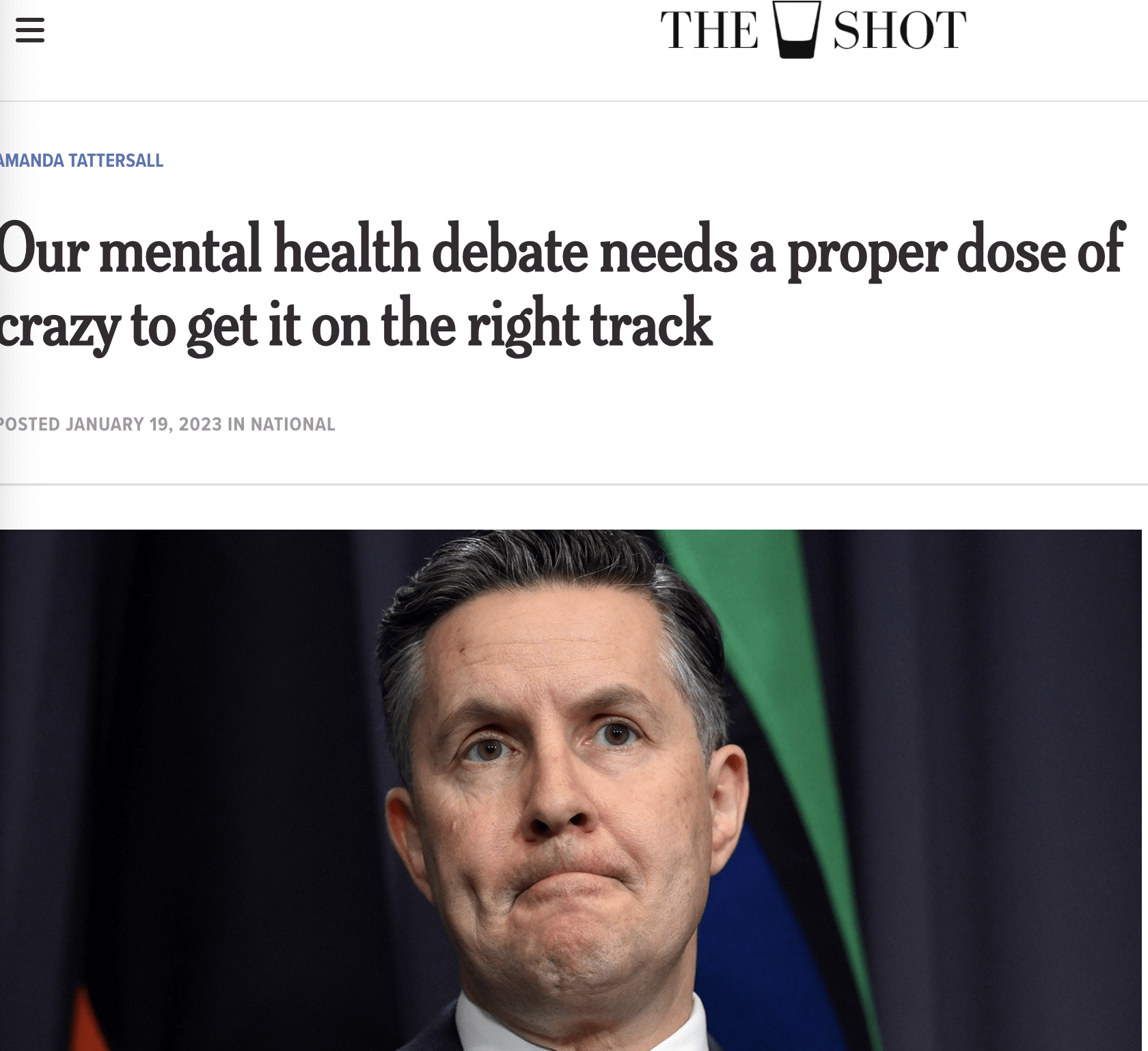Blogs & Speeches
Our mental health debate needs a proper dose of crazy to get it on the right track
A radical idea to transform how we think about mental health – and make mental health policy.
How involving people with lived experience in the mental health debate, and acknowledging how mental illness is not just a health issue – but a ‘whole of life’ issue – could transform how we think and support mental health
Citation:
Tattersall, A. (2023) Our mental health debate needs a proper dose of crazy to get it on the right track.The Shot, Jan 19.
Overview
At the end of last year, as our weary ‘living with Covid’ bodies honoured the silly season with a little more day drinking and a little less doom scrolling, Federal Health Minister Mark Butler confirmed that the government had no plans to save the Morrison government’s Covid-era bonus funding for mental health care.
The number of Medicare-funded trips to see a psychologist would return to 10 per year, Butler confessed, down from 20 under Morrison.
To say that many in the mental health space were surprised, is an understatement. The mental health plans had been extremely popular during Australia’s rolling covid lockdowns, when day drinking and doom scrolling proxied as diagnostic criteria for our exploding mental health crisis. For many the psychology sessions were a safety net, and at the height of the crisis it was speculated that this alongside other interventions had contributed to a reduction in the rate of suicide.
But Butler went on the front foot about his decision. He claimed on ABC radio that the extra funding had actually reduced access to mental health care for new patients, by clogging up the system with people who already had access to it. The number of psychologists is finite, and by doubling the number of sessions each person could get, the Government’s modelling suggested that the number of people accessing psychologists had dropped by 7%.
Pretty counter-intuitive, huh?
Of course, many medical practitioners were appalled by the decision, while others sided with the government, and a fierce debate raged for days.
On one side were psychiatric researchers – Ian Hickie, Pat McGorry, Jane Halton, Sam Harvey. They backed the government’s decision, agreeing that the axed subsidy wasn’t targeting those most in need, and called for a more focused approach to mental illness funding. On the other side, predominantly psychologists criticised the decision, arguing that it would cause harm to end a subsidy before a solution was developed, noting that it would have a particularly harsh effect on young people.
But how real was this so-called debate?
Far from a sign that we’re ready for a post-pandemic reckoning about our mental health crisis – this was a trifling brouhaha between medical professionals about how best to provide medical services. Some wanted “better evidenced based mental healthcare reform” (Hickie), others sought “specialised treatment programs for people with complex needs” (McGorry), alternatively people called for the maintenance of the 20 subsidised sessions (Harrigton), for doubling the sessions to 40 (Carr-Gregg) or for strategies to deal with healthcare workforce shortages.
Labelling this episode a debate had an unseen side effect – it helped us avoid having any actual debate about the biggest assumption guiding our approach to mental health – which is that the medical system is the answer to the mental illness crisis.
In late January, Mark Butler is holding a mental health roundtable with these medical professionals to hammer out some longer-term solutions. But as someone who’s been buffeted in and around the mental health system for decades, I’m not holding my breath. My fear is that the roundtable could end up another case of “if the only tool you have is a hammer, everything looks like a nail?” If you only take medical professionals into the brainstorm, then all you’ll come out with are more medical solutions.
You see, I’ve lived with bipolar disorder for 25 years and spent plenty of time on the other side of the doctors table, asking for help to manage my pattern of eye-watering highs and catatonic lows. I’ve given it my all; therapists and medication, psychiatrists and psychologists, as well as alternative care like acupuncture, exercise, mindfulness and too many self-help books. Living with mental illness involves spending a lot of time asking people for advice.
In some ways it was no surprise that they didn’t ask a bunch of crazy people like me to the come to the mental illness roundtable. We’re seen as the ones needing solutions, not providing them. But it was Albert Einstein who said that doing the same thing over and over again and expecting different results is the definition of insanity. So perhaps, by not asking for representation from us, they’re the insane ones?
I reckon the mental illness debate needs a good dose of wisdom from those of us who know all about insanity.

More work

Big Ideas Podcast – Living out your mental illness in public paves the way to lasting change with Amanda Tattersall
Amanda Tattersall, co-founder of the campaigning organisation Get-Up, speaks powerfully about her experience of living with bipolar disorder…

We can build a more inclusive government and economy out of the pandemic – this blueprint shows us how
A short conversation piece about the Real Deal report produced in 2020.

University under siege: a dangerous new phase for the Hong Kong protests
A look at the Hong Kong protests in 2019 as the contest around democracy entered the university space.